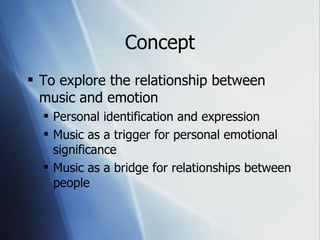Music&emotion
- 1. E 314 J Final Project Tracking Music and Emotion Wilgene David
- 2. Concept To explore the relationship between music and emotion Personal identification and expression Music as a trigger for personal emotional significance Music as a bridge for relationships between people
- 3. The Question: What Moves You? Why do we like music? Is it because of: Biological evidence? Psychological evidence? The actual music? The music theory? The people who make the music? The genre? Where we heard the music?
- 4. Is it the biology? “ The tremendous ability that music has to affect and manipulate emotions and the brain is undeniable, and yet largely inexplicable” (Vaidya) Studies have shown that there is pertinent brain activity when music is played Major keys and rapid tempos produce happiness Minor keys and slow tempos produce sadness Dissonance - It was found that the varying degrees of dissonance caused increased activity in the paralimbic regions of the brain, which are associated with emotional processes. Activity in the reward/motivation, emotion, and arousal areas of the brain which are areas that are usually stimulated by drugs, sex, or alcohol.
- 5. Is it the psychology? “ T h ere is something about music that evolves over time, as do emotions. When we hear the song we re-live the emotional sequence that happened when we first heard it,” says Professor John Sloboda of Keele University and author of Music and Emotion, “t h at’s why music is more powerful than, for example, smell or painting, it draws you into a sequence of re-lived experience.”
- 6. Is it the psychology? “ Darling, they are playing our song” Theory - At a time of heightened and intense emotion, the brain takes a recording of everything else going on, such as music. Triggers and Anchors - I n ternal states are essentially feeling and emotional states. When these states become conditioned responses to stimuli, the stimuli are called anchors and these anchors can be used to gain access to these emotional states.
- 7. Is it the music? Songs from your past Songs from before your time Songs that you hate Songs that you used to love Songs that you still love New songs
- 8. The Answer: Its You None of these answers regarding biology, psychology are wrong, but the common denominator is that music makes you FEEL something, and that’s why we like it. Musical tastes are subjective. The amount of “like-ability” is not something that can be quantified but is measured by the personal journey of the listener. If you ask someone why he or she love a song that they really do truly love, they would probably with something like, “Umm I don’t know, I just do! That is often what comes out when one tries to summarize something as tremendously complex as the personal relationship between music and emotion. While it is not a very helpful answer in the least bit, it is one that is very reasonable considering how deceivingly complicated the question is.Â
- 9. Its Personal The soul is what creates art, so the soul is what identifies with art. High Fidelity - “They belong to me, not to me and Laura, not me and Charlie, not me and Allison Ashworth, and though they make me feel something, they won’t make me feel anything bad DJ Culture - DJs don’t play to ears but play to emotion “ DJing is not just about choosing a few tunes. It is about generating shared moods; its about understanding the feelings of a group of people and directing them to a better place...The truth about DJing is that it is an emotional, improvisational art form and here the real scope for artistry lies. A good DJ isn't just stringing records together, he's controlling the relationship between some music and hundreds of people.” (Brewster and Broughton)
- 10. Its Personal Dance - “The emotional life of any community is clearly legible in its art forms, and because the dance seeks continuously to capture moments of life in a fusion of time, space and motion, the dance is at a given moment the most accurate chronicler of culture pattern.” (Dunham) Favorites - Songs, artists, genres, concerts Connecting people and impacting communities Jazz










